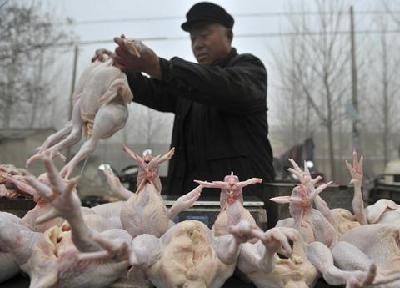
The race to meet the world's growing appetite for animal products may increase the risk of both human and animal diseases, according to experts, who urge policymakers to consider health implications along with the need to boost production.
As the human population has grown and become wealthier, the demand for high-quality animal protein has skyrocketed.
For example, from 1990 to 2005, Asia alone added roughly one billion humans, but 10 billion chickens, according to UN figures.
Farmers are raising more animals in smaller spaces than in the past and in places that have not been used this way before, like in virgin forests or near-dense urban environments. And this intensification is often taking place in poor conditions and with few regulations, according to animal disease expert Delia Grace from the International Livestock Research Institute.
"You can get conditions which actually have never been experienced during the time of animal intensification in the West, or anywhere else in the world," says Grace. "And these kinds of completely novel conditions are giving rise to novel diseases."
Grace says most of those novel diseases do not cause a great deal of harm. But some do. A recent example is the H5N1 avian influenza, also known as bird flu. More than 300 people have died from it to date, and the virus continues to circulate, killing one person in Cambodia this year. But Grace says one good thing has come out of the experience.
"Avian influenza has been something which has made people re-think certainly the interdependence between animal health and human health," says Grace.
She believes policymakers especially in the developing world need to consider both human and animal health impacts because an estimated 700 million people there keep farm animals, and they provide up to 40 percent of household income.
While animal diseases can pose a threat to human health, she says controlling them can pose an economic threat, if not done properly. She points to a call by some public health officials for eliminating backyard poultry flocks in response to avian influenza outbreaks.
"It's a call from public health without thinking about the implications for poor people's livelihoods," she says.
Grace says there are good examples of public health measures that protect incomes at the same time. In a new report, she highlights how Kenya changed regulations calling for all milk to be pasteurized - a requirement that would have put small producers out of business.
"Smallholder milk production was incredibly important as a pathway out of poverty. And also that the health risks could be avoided not by banning or arresting these traders, but by giving them training and certification and some simple technology so that they could handle milk more safely."
Grace says as the pressure to intensify livestock production increases in response to growing demand, policymakers will need to carefully balance public health, animal health, and economic health.
avian influenza: the technical name for bird flu 禽流感
pasteurize: to heat a liquid, especially milk, to a particular temperature and then cool it, in order to kill harmful bacteria 用巴氏杀菌法消毒
South Korea battles renewed spread of bird flu
Avian flu alert as Hong Kong sees first case in 7 yrs
Indonesian girl dies from bird flu, 3 undergo tests
Study: H1N1 not more serious than seasonal flu
(来源:VOA 编辑:崔旭燕)
